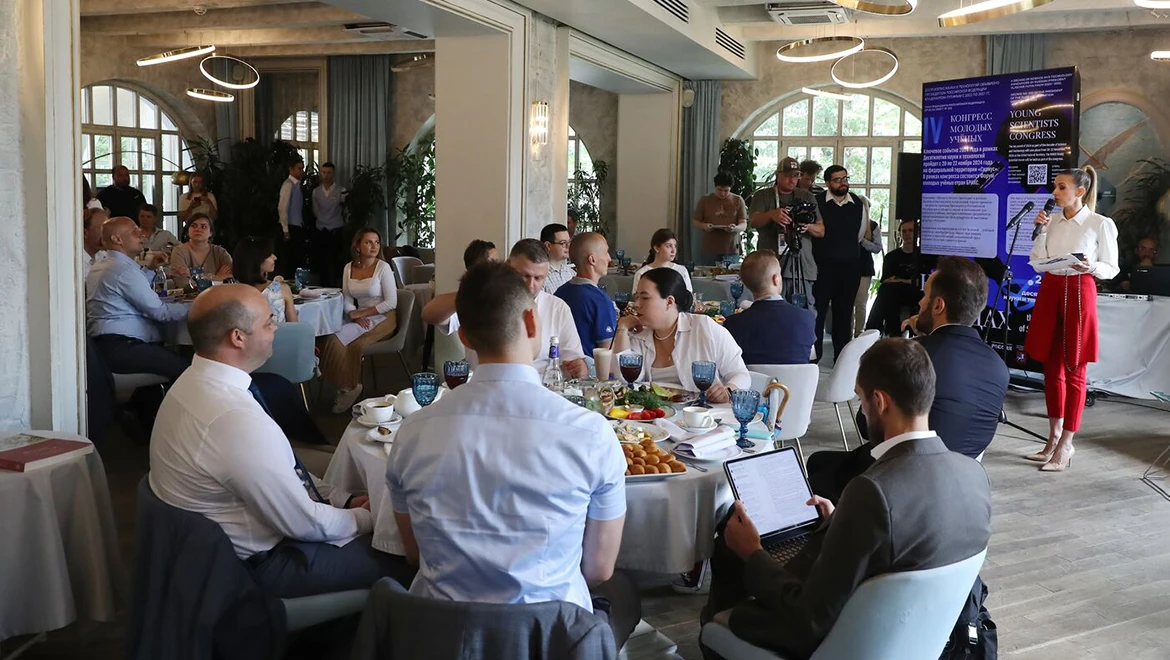Representatives of science and Russian companies discussed the country's technological sovereignty at the RUSSIA EXPO
On July 5, a scientific breakfast "Technological Sovereignty: State and Business Partnership in the Development of Science and Technology" was held as part of the exposition "Faces of Science". Representatives of the scientific community, the Ministry of Science and Higher Education, as well as major Russian companies discussed unique technologies in the field of artificial intelligence, medicine, and transport.
During the discussion, Anastasia Zvyagina, Deputy Director General of the RUSSIA EXPO, drew attention to the importance of popularizing science among children and told how the Exposition got children interested in science.
"Our Exposition was created for the younger generation. Just as part of children's organized groups, we have been visited by about half a million children from all over the country. Among other things, the "Atom" and "House of Polymers" pavilions are open at the Exposition, where children are taught about science in an accessible and interactive way. When children get there, they become interested in it, and then they can connect their life path with science," said Anastasia Zvyagina.
Ali Asadov, Head of the Department for Work with Young Scientists of the Ministry of Science and Higher Education of Russia, told the participants about the strategy of scientific and technological development.
"One of the innovations in the strategy of scientific and technological development is the introduction of the concept of "qualified customer", who does not just set a task and walk away, but the one who at the stage of development of the technical task and development of the project itself takes an active part in this whole process. This can be a large business or a region. At the same time, such partnership should be mutually beneficial, and investments should be profitable," Ali Asadov emphasized.
The event also featured participants from the "Faces of Science" project — leaders of research centres and scientific departments of corporations. During the science breakfast, they presented their innovative developments to the guests.
Konstantin Vernigorov, Director General of SIBUR PolyLab Research Centre for the development and testing of polymer products, spoke about the development of new polymer materials, including those incorporating recycled plastic, and how the petrochemical industry supports the advancement of key economic sectors.
Vadim Pereverzev, Chief Designer of the Unified Modular Platform and AURUS brand vehicles, shared his emotions with the participants about being asked to lead the development of vehicles at NAMI in 2014. According to him, the project reached a new level in 2018 with the introduction of the AURUS Senat Limousine to the audience. Almost all the car's components are of Russian production.
Vladislav Parfenov, Head of the Scientific Projects Implementation Group of the Scientific Division of the Rosatom State Corporation, spoke about the development of a complex of innovative devices for growing blood vessels from the patient's biomaterial, ongoing research, and how these vessels are not only "printed" but also learn to develop and grow — which is especially important for transplantation.
Alexei Chupov, Chief Designer of the Scientific Design Bureau of Medical Devices of the Ural Optical and Mechanical Plant named after E.S. Yalamov of the Shvabe Holding of the Rostec State Corporation, presented the multifunctional open resuscitation system for intensive care of newborns ORS-BONO. This is the first device in Russia for nursing newborns, combining a phototherapy module, an infrared heater and a respiratory unit in its design. The system helps reduce the time needed for nursing and treating infants and minimizes the risks of complications.
The "Faces of Science" exposition is part of the "Science Nearby" initiative of the Decade of Science and Technology, announced by a decree of the President of the Russian Federation, and is held with grant support from the Ministry of Science and Higher Education of the Russian Federation. The exposition is supported by the Roscongress Foundation and the Coordinating Council for Youth Affairs in the Scientific and Educational Spheres under the Presidential Council for Science and Education. The project partner is SIBUR.
This unique project, implemented in the format of an interactive tour, invites children to embark on an unforgettable journey across the regions of the country.
On 6 January, a showing of the multi-genre performance "Morozko" took place at the National Centre RUSSIA. It was held for guests and veterans of the special military operation who participate.




